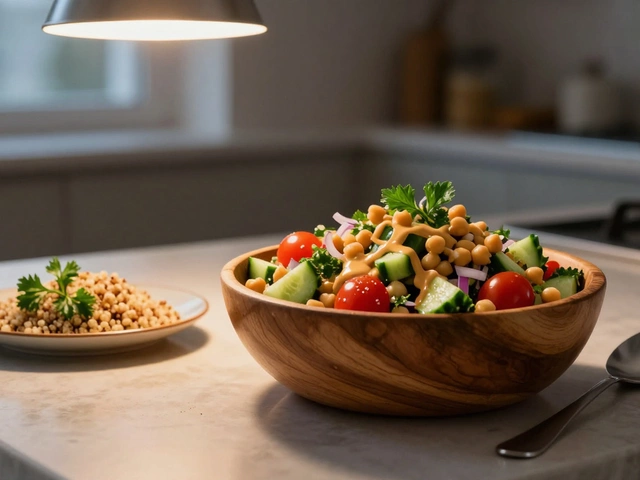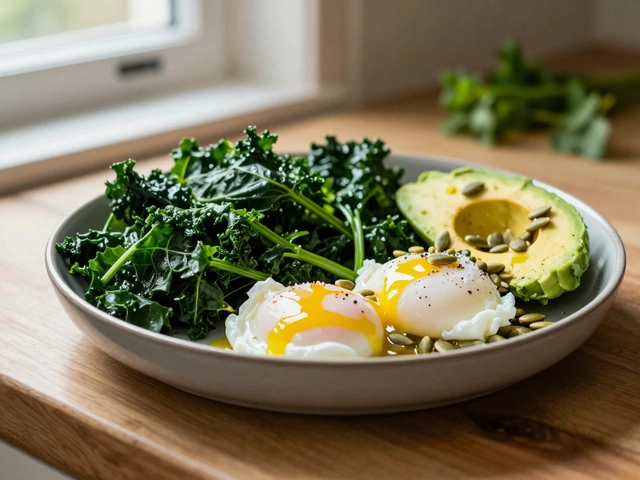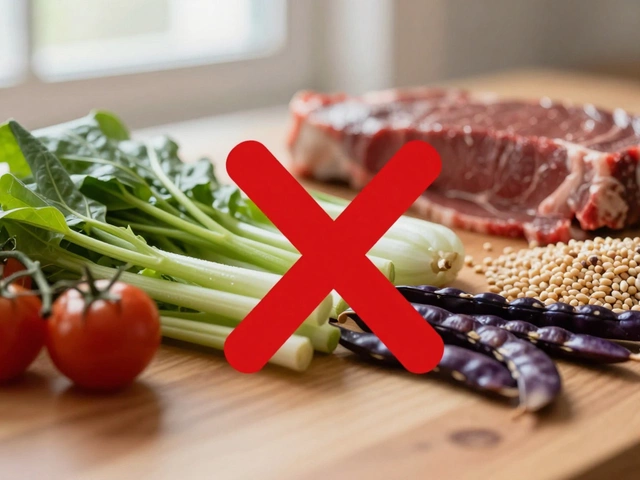If you're living the vegetarian life, you're probably aware of the nutrition puzzle you need to solve to stay healthy. Sure, skipping meat can be great for the environment and often for your heart, but there's a catch— certain nutrients might not be as easy to come by in a plant-based diet.
One of the biggies is Vitamin B12. This essential nutrient mainly found in animal products is crucial for keeping your nerve and blood cells ticking smoothly. Fear not though, fortified foods like cereals and plant milks can come to your rescue.
Iron also deserves your attention since plant-based sources of iron aren't absorbed as efficiently as those from meat. Beans, lentils, and spinach are potent picks, and pairing them with Vitamin C-rich foods can enhance absorption.
- Understanding Common Nutrient Deficiencies
- Essential Vitamins and Minerals to Monitor
- Plant-Based Sources of Key Nutrients
- Simple Recipes to Boost Nutrient Intake
Understanding Common Nutrient Deficiencies
When it comes to a vegetarian diet, some nutrients can slip through the cracks if you're not careful. This isn't to scare anyone off from going vegetarian, but more to arm you with the right knowledge so you can make informed choices.
Vitamin B12
Let's start with Vitamin B12. This guy is crucial for DNA production and the proper function of your brain and nervous system. The downside? It's not naturally found in plant-based foods. Your best bets are fortified foods or a B12 supplement. Don't underestimate this one – low B12 can lead to serious issues like fatigue and memory problems.
Iron
Next up is iron. Plant-based iron, known as non-heme iron, isn't absorbed as efficiently as the heme iron found in meat. This means vegetarians have to eat more of it to get the same benefit. Foods like lentils, chickpeas, and pumpkin seeds are packed with iron. Pair these with foods rich in Vitamin C, like bell peppers or oranges, to boost absorption.
Omega-3 Fatty Acids
If you've ditched fish too, Omega-3s might be getting skipped. These essential fats are vital for heart health. Flaxseeds, chia seeds, and walnuts can help bridge this gap, but keep an eye on how much you're getting.
Calcium
Calcium is another biggie if milk and cheese aren't part of your diet. Without enough calcium, you risk weaker bones. Go for leafy greens, almonds, and fortified plant milks to get your daily dose.
Staying informed is key when following any diet, and a vegetarian lifestyle is no different. Remember, each of these nutrient deficiency woes has a fix – it's all about balance and variety in your meals.
Essential Vitamins and Minerals to Monitor
When you're rocking a vegetarian diet, keeping an eye on specific vitamins and minerals is key. Let's dive into the essentials that deserve your attention.
Vitamin B12
This is often at the top of the list because it's crucial for brain health and the production of DNA and red blood cells. Naturally found in animal products, vegetarians need to seek out fortified foods. Options such as fortified cereals, nutritional yeast, and plant-based milks can help plug this gap.
Iron
Iron is your go-to for energy and focus, but plant-based sources like spinach and lentils aren't as easily absorbed by your body. Boost your intake by pairing these iron-rich foods with Vitamin C-laden fruits and veggies like oranges and bell peppers, as this combo enhances absorption.
Calcium
You probably know that calcium keeps your bones strong. When you're skipping dairy, pile your plate with leafy greens, almonds, and tofu. Some cereals and juices are also calcium-fortified which can add to your daily intake.
Omega-3 Fatty Acids
These are important for brain and heart health, but are mainly found in fish. To get your fill, look for flaxseeds, chia seeds, and walnuts. Consider an algae-based Omega-3 supplement if you're feeling cautious.
Zinc
Zinc plays a role in immune function and cell repair. You can find it in beans, chickpeas, and pumpkin seeds, all friendly choices for a vegetarian diet.
Vitamin D
Your body can make Vitamin D via sunlight exposure, but when that's not cutting it, fortified foods and supplements may come into play. Particularly in winter months, when soaking up enough sun can be tricky.
| Vitamin/Mineral | Sources |
|---|---|
| Vitamin B12 | Fortified cereals, nutritional yeast, plant-based milks |
| Iron | Spinach, lentils, Vitamin C foods |
| Calcium | Leafy greens, almonds, tofu |
| Omega-3 | Flaxseeds, chia seeds, walnuts |
| Zinc | Beans, chickpeas, pumpkin seeds |
| Vitamin D | Sunlight, fortified foods |
So there you have it! Keeping tabs on these nutrients can make all the difference in crafting a thriving and balanced vegetarian nutrition. Keep it simple, and check those labels to ensure you're hitting your daily targets.

Plant-Based Sources of Key Nutrients
Eating a vegetarian diet doesn't mean missing out on essential nutrients. There are plenty of plant-based sources to keep your health game strong.
Iron
Iron is crucial. Many veggies pack a hefty iron punch. Think spinach, lentils, and chickpeas. These guys are your go-tos. But here's a tip: Pair them with foods rich in Vitamin C like bell peppers, strawberries, or citrus fruits to boost absorption.
Vitamin B12
There's no shortcut here, as Vitamin B12 is mostly found in animal products. However, you can get it through fortified foods like breakfast cereals and nutritional yeast. And don’t forget about B12 supplements if you’re totally plant-based.
Omega-3 Fatty Acids
You don't need fish to keep your Omega-3 levels up. Chia seeds, flaxseeds, and walnuts are rich in alpha-linolenic acid (ALA), the plant-based forerunner to Omega-3s. Sprinkle these on salads or add to smoothies.
Protein
A lot of folks think skipping meat means skipping protein. Not true! Beans, lentils, tofu, and quinoa are packed with protein. No need to worry about your muscle gains here.
Calcium
If you're skipping dairy, load up on fortified plant milks and juices. They can have as much calcium as cow's milk. Also, tofu and dark leafy greens like kale and bok choy are great picks.
| Nutrient | Common Plant-Based Sources |
|---|---|
| Iron | Spinach, lentils, chickpeas |
| Vitamin B12 | Fortified cereals, nutritional yeast |
| Omega-3 Fatty Acids | Chia seeds, flaxseeds, walnuts |
| Protein | Beans, tofu, quinoa |
| Calcium | Fortified plant milks, tofu, kale |
With these options in your kitchen armory, maintaining a balanced diet while living the vegetarian lifestyle is totally doable. And the best part? You might find you don't miss meat at all.
Simple Recipes to Boost Nutrient Intake
Diving into the world of vegetarian cooking doesn't have to be a daunting task, even when you’re aiming to up your nutrient game. These straightforward recipes help fill those pesky nutritional gaps.
Spinach and Lentil Soup
This soup is not just cozy; it's loaded with iron and Vitamin C, making it a strong contender in your weekly meal rotation.
- Ingredients: 1 cup lentils, 2 cups fresh spinach, 1 onion diced, 2 cloves garlic minced, 4 cups vegetable broth, 1 teaspoon cumin.
- Instructions: Sauté the onion and garlic until fragrant. Stir in lentils and cumin, then pour in the broth. Let it simmer for 20 minutes. Add spinach and cook for another 5 minutes.
Quinoa and Black Bean Salad
This protein-packed salad is brimming with vegetarian nutrition. Perfect for a quick lunch.
- Ingredients: 1 cup cooked quinoa, 1 can black beans, 1 red bell pepper, 1 avocado, 2 tablespoons lime juice.
- Instructions: Mix all ingredients in a bowl. Drizzle with lime juice and season with salt and pepper.
Tofu Stir-Fry
Tofu is a powerhouse that brings a hefty dose of protein and vegetarian diet flexibility to your table.
- Ingredients: 1 block firm tofu, 2 cups mixed vegetables (like broccoli, carrots, bell peppers), 2 tablespoons soy sauce, 1 tablespoon sesame oil.
- Instructions: Cube tofu and sauté until golden. Add vegetables and soy sauce, stir until veggies are tender-crisp.
For an extra dose of nutrients, here’s a quick overview of the key vitamins and minerals in these dishes:
| Recipe | Nutrients Boosted |
|---|---|
| Spinach and Lentil Soup | Iron, Vitamin C |
| Quinoa and Black Bean Salad | Protein, Fiber |
| Tofu Stir-Fry | Protein, Calcium |
With these recipes in your culinary arsenal, you're well on your way to tackling the most common challenges of a vegetarian nutrition plan. Quick, nutritious, and anything but boring!



